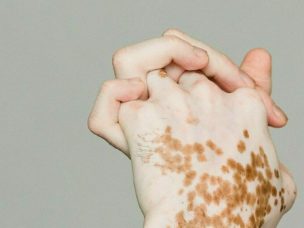Vitiligo
Eyes on Vitiligo: The Impact of Vitiligo on Your Eye Health
A comprehensive review sheds light on the impact vitiligo can have on your eye health. This information may help you manage your eye health effectively and understand why regular eye check-ups are important. Vitiligo may affect your eye health in addition to causing a loss of skin pigmentation. Dry eye disease and changes in eye...
The Health Risks Associated With Vitiligo
Are you living with vitiligo? Here’s what you need to know about its potential associated health risks. Early detection and management could help you control vitiligo symptoms and maintain a healthy lifestyle. Vitiligo is more than skin deep, involving a mix of genetics, oxidative stress, and immunity. If you have vitiligo, you might have a...
Micro-Needling and Topical 5-Fluorouracil: A Potential Vitiligo Treatment
Recent research suggests that a combination of micro-needling and topical 5-fluorouracil could offer better outcomes for vitiligo patients compared to using topical tacrolimus alone. This may be a vital step towards more effective vitiligo management. Vitiligo is an autoimmune skin disorder characterized by loss of pigmentation, creating white patches on the skin. A recent study...
Vitiligo Treatment Options: Exploring Medical and Alternative Approaches
Various vitiligo treatment options are available, from medical solutions, like topical corticosteroids and light therapy, to alternative approaches, such as herbal remedies and mind-body therapies. Learn about approaches tailored to your needs while you strive toward better skin health. Topical corticosteroids and calcineurin inhibitors are commonly used medical treatments for vitiligo, while light therapy and...
Coping With the Emotional Impact of Vitiligo
Learn to cope with the emotional impact of vitiligo by embracing your uniqueness, practicing self-love, connecting with others, and exploring creative outlets. Various coping strategies can help support emotional well-being so you can navigate life with vitiligo confidently. Living with vitiligo can bring about a mix of emotions, but it’s important to recognize and acknowledge...
Vitamin D Receptor Polymorphisms and Vitiligo Susceptibility
Vitamin D receptor polymorphisms may impact vitiligo susceptibility, and this study analyzes that possibility in various geographic regions as it relates to specific polymorphisms. Although the specific conclusions are still being debated, previous research indicates associations between vitamin D receptor (VDR) polymorphisms and susceptibility to vitiligo. This study, published in the Journal of Cosmetic Dermatology,...
Oxidative Stress and Vitiligo Onset
A precise pathogenesis of vitiligo is not yet understood, but this article suggests that it is based on oxidative stress and heightened levels of reactive oxygen species. There are many hypotheses about the pathogenesis of vitiligo, but the most commonly accepted is that of an oxidative stress-induced immune response. This immune response ultimately leads to...
Living Your Best Life With Vitiligo: Tips for Skincare
Learn skincare tips for living with vitiligo, focusing on gentle products, sun protection, and makeup options for self-expression. Find out how to embrace your vitiligo while connecting with others for support and inspiration. Skincare for vitiligo should focus on gentle, nourishing products to keep skin healthy and hydrated. Sun protection is crucial for those with...
Depression Rates Are High in Patients With Vitiligo
People living with vitiligo experience high rates of depression. These rates are higher in Asians and females. People living with vitiligo have visible changes in their skin pigmentation. A study published in the Journal of the European Academy of Dermatology & Venereology aimed to provide a pooled estimate of the rates and odds of depression...
More Medical News














